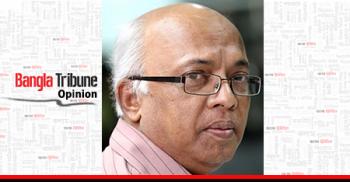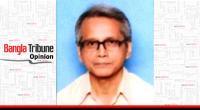 Some rather strange permutations and combinations have been going within the political opposition. To all intents and purposes, former foreign minister Dr Kamal Hossain and former president AQM Badruddoza Chowdhury, after a brief spring of unity, have fallen apart. The surprise is not that the two men have decided to go their separate ways, for such collapse in efforts toward political unity is but natural in a democratic dispensation. What does raise a question, however, relates to principles.
Some rather strange permutations and combinations have been going within the political opposition. To all intents and purposes, former foreign minister Dr Kamal Hossain and former president AQM Badruddoza Chowdhury, after a brief spring of unity, have fallen apart. The surprise is not that the two men have decided to go their separate ways, for such collapse in efforts toward political unity is but natural in a democratic dispensation. What does raise a question, however, relates to principles.
On the face of it, Badruddoza Chowdhury appears to be on high moral ground where forging an anti-ruling party front in light of the forthcoming elections is concerned. His Jukto Front has made it known that its position on the modalities by which the Bangladesh Nationalist Party could be included in the opposition unity process depends on the BNP’s agreeing to sever links with the Jamaat-e-Islami. Coming from Chowdhury, a founding member of the BNP who has served as a minister and briefly as the country’s president before he was forced out by the party, the demand made for a jettisoning of the Jamaat has resonated with large numbers of citizens. This disinclination on the part of the Jukto Front and indeed Chowdhury’s Bikalpadhara to have anything to do with the Jamaat was in a good number of ways a reflection of its acknowledgement of current political realities in the country.
Badruddoza Chowdhury has thus not disappointed the country. That role now clearly been expropriated by Dr Kamal Hossain and the political elements gathered around him. The BNP is today surely in a cheerful mood, for it could have expected nothing better than a march back into the centre of political discourse. For a party which has been out of office for 12 years and out of parliament for five; which has seen a good number of its political playmates mount the gallows upon conviction for war crimes; which has witnessed its dynastic mother-son leadership sentenced to jail terms; and which has had the verdict in the 21 August grenade blast case further erode its reputation, it is a godsend for it to be welcomed into the ‘Jatiya Oikya Front’ by Kamal Hossain. Politics does make strange bedfellows. But rarely is there an instance when politics becomes a theatre of the bizarre.
If Badruddoza Chowdhury’s is a principled stance, vis-à-vis a rejection of anti-Liberation forces, where opposition unity against the ruling Awami League is concerned, that of Kamal Hossain and his friends—and they are from a very enervated faction of the JSD, Nagorik Oikya, his own Gano Forum and, to be sure, the BNP—gives every impression of an alliance serving up some of the very outmoded ideas which have undermined national politics for long. The BNP’s entry into the Jatiya Oikya Front has palpably been made easy, for no conditions of the kind Badruddoza Chowdhury’s Jukto Front came forth with have been imposed on the party by the Kamal Hossain-led front.
That spells trouble for the front and does little credit to Dr Hossain’s reputation as a political figure. In an atmosphere where the BNP’s marriage with the Jamaat has not only undermined the party of the Zia family but has also raised legitimate questions about its role regarding the fundamental national principles as demonstrated during the War of Liberation and subsequently enshrined in the Constitution, the Jatiyo Oikyo Front has not made the wisest of moves. No questions have been asked of the BNP regarding its ties with the Jamaat. It was a happy Mirza Fakhrul Islam Alamgir and Moudud Ahmed who shared the stage with an individual whose politics, shaped in the glow of Bangabandhu’s leadership through the 1960s and all the way to the mid-1970s, philosophically is miles removed from the ‘Bangladeshi nationalism’ of the BNP.
If an effective and effectual opposition is a probable answer to the Awami League, the Jatiyo Oikyo Front gives the country little cause for enthusiasm. On its platform are men, besides those from the BNP, whose public appeal remains negligible. Mahmudur Rahman Manna has suffered at the hands of the ruling Awami League, but his suffering has not translated into popular appeal. The Gano Forum has in all the years it has been in circulation not had much of an impact on the public imagination beyond the reputation of its leader. As for ASM Abdur Rab’s faction of the JSD, it continues to suffer from the crisis of identity it plunged into during the Ershad years, when it served as a so-called opposition in Parliament and went on to be part of Sheikh Hasina’s first government between 1996 and 2001 before resuming its anti-AL stance in subsequent years.
There is little question that the country is in need of a credible, united and principled opposition as it prepares for a fresh general election. A free and transparent election, with all political parties given a level playing field, is certainly a popular demand. But all of this presupposes the adoption of platforms by political parties and alliances ready and willing to eschew the negativism of the past. Unfortunately, in light of the developments taking place in the opposition camp, disparate as it is in form and ideology and psychology, the nation has been promised more of the same.
That is a pity.
Syed Badrul Ahsan is the editor-in-charge at The Asian Age


